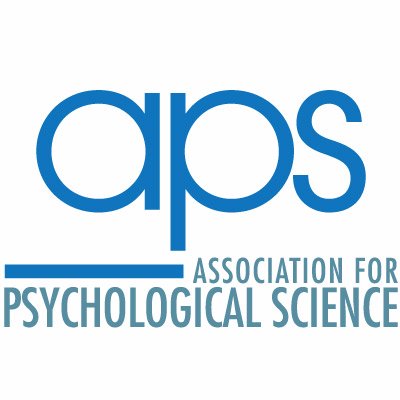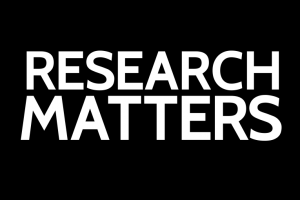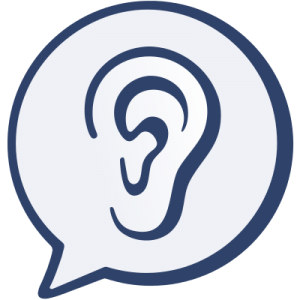Selected links to the SMART Lab in the media:
(Listed Chronologically)
Ever wonder why music makes us feel such powerful emotions? How can we use music to help people living with communication deficits?
Visit the SMART lab blog for lay-summaries of current research projects.
NeuroTechX Showcase (Podcast) (November 11, 2021)
Frank Russo discusses the effects of music on the brain with Chris Micheli and John Griffiths!
Living in a world without sound (November 9, 2019):
 Why it’s healthy to sing this holiday season (December 17, 2018):
Why it’s healthy to sing this holiday season (December 17, 2018):
More than other social activities such as team sports or card games, group singing seems to have the ability to generate feelings of social connectedness, says Dr. Frank Russo, a professor of psychology at Ryerson University.
 ‘SingWell Canada’ project studies bio-psycho-social impact of group singing (December 11, 2018):
‘SingWell Canada’ project studies bio-psycho-social impact of group singing (December 11, 2018):
Reshmi Nair speaks with Dr. Frank Russo, a Professor of Psychology at Ryerson who is studying the effects of group singing, particularly in older adults with communication disorders like Alzheimers and Parkinsons.
 Why it’s healthy to sing this holiday season (December 8, 2018):
Why it’s healthy to sing this holiday season (December 8, 2018):
Looking for connection with others this holiday season? Professor Frank Russo on why it’s good for you to get out and sing your heart out with others.
Can singing in a choir help with hearing loss? (September 29, 2017)
Professor Frank Russo and graduate student Ella Dubinsky speak about benefits of choir singing for people with hearing loss.
 Telus supports app designed to improve communication skills for children with autism (September 29, 2017):
Telus supports app designed to improve communication skills for children with autism (September 29, 2017):
Big Break: The Acting Game is an educational app that supports social communication skills in children and teens. Although the game can be enjoyed by anyone, it is ideal for children with communication difficulties, including children with autism spectrum disorder (ASD). Most individuals with ASD face challenges in typical social interactions. TELUS’ contribution supported program design and delivery of the app, its development, and the creation of a program guide.
 Using music to improve hearing, build social connection (August 17, 2017):
Using music to improve hearing, build social connection (August 17, 2017):
Researchers at Ryerson University’s SMART Lab are making more than just music. With the help of the Chang School, industry partners, and a couple of dozen or so seniors, they’re making a social impact as well.
 A new approach to autism (August 17, 2017):
A new approach to autism (August 17, 2017):
Can drama and music help the emotional responsiveness of children with autism? This is the question behind “Big Break: Singing and Drama” camp, a program that engages preteens and teenagers (ages 10-14) living with autism in singing, acting and movement games.
 Music and better hearing: What’s the connection? (July 20, 2017):
Music and better hearing: What’s the connection? (July 20, 2017):
Healthy Hearing interview with Professor Russo and graduate student Ella Dubinsky. Singing may benefit your hearing by improving the way you understand conversations which take place in noisy places— and it’s fun!
 ‘Like Brain Boot Camp’: Using Music To Ease Hearing Loss. (May 31, 2017):
‘Like Brain Boot Camp’: Using Music To Ease Hearing Loss. (May 31, 2017):
NPR interview featuring the SMART Lab, Ella Dubinsky’s master thesis work on music and hearing loss, and the Ryerson Chang School 50+ choir. (To listen to the 8.15 minute interview, press the blue and white “play” button beside the title)
 The Science of Tone Deafness. (July 27, 2016):
The Science of Tone Deafness. (July 27, 2016):
The Agenda in the Summer welcomes Falconer as well as Frank Russo, psychology professor and director of the SMART Lab at Ryerson University to discuss the science of tone deafness.
 Can anyone learn to sing? (May 22, 2016):
Can anyone learn to sing? (May 22, 2016):
Article on Falconer’s book “Bad Singer” describes Emoti-chair and our research on non-auditory aspects of music.
 How Music Affects Your Brain And Body (November 2015):
How Music Affects Your Brain And Body (November 2015):
Associate Professor of Psychology and Founder of the SMART lab, Frank Russo, joins Melanie Cole, MS, to discuss how music can affect your brain and body.
 What’s Happening in Your Brain and Body as You Listen to Music (November 2015):
What’s Happening in Your Brain and Body as You Listen to Music (November 2015):
“The effect of music on the brain or body depends in part on its genre,” Frank A. Russo, PhD, associate professor of psychology at Ryerson University, tells Yahoo Health.
 Parkinson’s Choir may help “masked face syndrome” (September 2015):
Parkinson’s Choir may help “masked face syndrome” (September 2015):
A choir of Canadians with Parkinson’s disease is helping researchers test how well the performers regain facial movement to express emotions.
 Strengthening voices: Using singing to combat Parkinson’s (June 2015):
Strengthening voices: Using singing to combat Parkinson’s (June 2015):
Beautiful music, good side effects!
CBC RADIO- Metro Morning Interview with Frank Russo (June 2015)
Unlocking story on development of emotion feedback technology with WaveDNA (March 27, 2015):
The 
 emerging field of neuroanalytics is helping us to better understand our emotional reactions. A team of researchers at Ryerson University’s SMART Lab is collaborating with WaveDNA to put these new techniques to work, gaining insights into what we feel when we listen to music.
emerging field of neuroanalytics is helping us to better understand our emotional reactions. A team of researchers at Ryerson University’s SMART Lab is collaborating with WaveDNA to put these new techniques to work, gaining insights into what we feel when we listen to music.
Yonge Street- New therapies are helping children with autism overcome sensory barriers (August 20, 2014):
 Several Toronto organizations have positioned themselves at a critical juncture to help children with sensory integration, emotional perception, and communication issues faced as a result of an ASD diagnosis.
Several Toronto organizations have positioned themselves at a critical juncture to help children with sensory integration, emotional perception, and communication issues faced as a result of an ASD diagnosis.
Ottawa Magazine- The pills, thrills, and chills of an MDMA trip (July 9, 2014):
The popularity of  electronic music in Ottawa is rising — as is its go-to drug, MDMA. This article, in which author David Meffe explores the local scene following the tragic death of a friend, first appeared in OTTAWA Magazine’s May issue.
electronic music in Ottawa is rising — as is its go-to drug, MDMA. This article, in which author David Meffe explores the local scene following the tragic death of a friend, first appeared in OTTAWA Magazine’s May issue.
(January 15, 2014) :
Beside the front doors of the Montreal Neurological Institute and Hospital, perched on the south side of Mount Royal overlooking the city, is a quote from the institute’s famous founder Wilder Penfield: “The problem of neurology is to understand man himself.”
CBC Music Roundup- Five classical music innovations, from Google Glass to Emoti-Chair (online feature) (December 10, 2013) :
For many audience members, the appeal of the concert hall is its status  as a mostly technology-free zone. Where else do crowds collectively shut off cellphones to be truly in the moment? But technology is increasingly prevalent in our lives, and its presence in the concert hall is inevitable.
as a mostly technology-free zone. Where else do crowds collectively shut off cellphones to be truly in the moment? But technology is increasingly prevalent in our lives, and its presence in the concert hall is inevitable.
Maclean’s Special Ebook: “The New Brain” (2013): Join us for a giant brainstorming session on what the world’s neuroscience superstars are keeping top of mind.
Maclean’s Magazine- Let the Rhythm take Control (September 1, 2013)
CBC Radio 1 Scientists taking new interest in music (August 9, 2013)
United Observer- Sweet Soul Music (April 1, 2013): New research shows that raising your voice in song can help lift the fog of depressionBy Vivien Fellegi.
CTV NEWS (National) Brain hijacked by catchy songs (March 25, 2013)
What’s up Yukon- Rekindling a passion for culture (February 14, 2013): The students of Eliza Van Bibber  School, along with numerous supportive partners, are reviving the cultural wellbeing of the community through traditional practices. It started with a music psychology student from Ryerson University in Toronto. Arla Good had the incentive to learn about the traditional music of the North.
School, along with numerous supportive partners, are reviving the cultural wellbeing of the community through traditional practices. It started with a music psychology student from Ryerson University in Toronto. Arla Good had the incentive to learn about the traditional music of the North.
 The GRID- Nursing home confidential (January 22, 2013): Nightclubs and concert venues aren’t the only places aspiring and established performers ply their trade. We take a look inside the surprisingly rich and varied seniors’ entertainment circuit.
The GRID- Nursing home confidential (January 22, 2013): Nightclubs and concert venues aren’t the only places aspiring and established performers ply their trade. We take a look inside the surprisingly rich and varied seniors’ entertainment circuit.
CBC News (The National)- Music therapy offers hope for Alzheimer’s; Parkinson’s Patients with cognitive impairment benefit from singing (December 29, 2012): Music might help people with cognitive impairment, including Alzheimer’s and Parkinson’s disease, a study suggests.
impairment benefit from singing (December 29, 2012): Music might help people with cognitive impairment, including Alzheimer’s and Parkinson’s disease, a study suggests.
CBC Radio 1- Creating identity through traditional song and dance in Pelly Crossing (Yukon) (December 10, 2012)
The Synapse Magazine- Frontiers of Cross-Modal Display: The Emoti-Chair as a Model Human Cochlea (September 27, 2012)
Examiner.com- Centre provides music services for special needs kids (June 23, 2012): The Centre for  Music Education & Cognition (C-MEC) is currently offering music lessons for special needs children in the greater Toronto area and is researching how these children benefit from a musical education.
Music Education & Cognition (C-MEC) is currently offering music lessons for special needs children in the greater Toronto area and is researching how these children benefit from a musical education.
The Grid TO- Toronto the Better (May 24, 2012)
CBC North- True North (April 30, 2012)
 Maisonneuve Magazine – Face the Music (Apr 2, 2012): How can someone who passionately loves music also be a terrible singer? Tim Falconer takes up voice lessons—and discovers the surprising science of tone deafness
Maisonneuve Magazine – Face the Music (Apr 2, 2012): How can someone who passionately loves music also be a terrible singer? Tim Falconer takes up voice lessons—and discovers the surprising science of tone deafness
Studiofeed -The Power of Creativity (April 2012): In The City: Sick Kids Art and Music Showcase
Studiofeed – Music and the Brain: The SMART Lab (March 2012): Why do you listen to music? If you are like thousands of other Canadians, your answer may lie in music’s perceived ability to regulate your mood – to cheer you up or to calm you down.
 CBC Radio 1- Here and Now (January 2012): For many people, the hum and buzz of the city is just noise pollution. But it’s music to the ears of some Ryerson researchers.
CBC Radio 1- Here and Now (January 2012): For many people, the hum and buzz of the city is just noise pollution. But it’s music to the ears of some Ryerson researchers.
 BlogTO – Listening in on the Toronto Sound Map (January 2012): The sound of the street — the swish of passing cars, the rumble of the subway and the chatter of strangers — is something as city dwellers we all experience on a daily basis, whether we choose to or not.
BlogTO – Listening in on the Toronto Sound Map (January 2012): The sound of the street — the swish of passing cars, the rumble of the subway and the chatter of strangers — is something as city dwellers we all experience on a daily basis, whether we choose to or not.
 Toronto Standard – Raving with the Deaf (December 2011): Sencity has put on raves for the deaf in Mexico, Brazil, Finland, Spain, and South Africa, with Montreal on the agenda for 2012. What, no Toronto?
Toronto Standard – Raving with the Deaf (December 2011): Sencity has put on raves for the deaf in Mexico, Brazil, Finland, Spain, and South Africa, with Montreal on the agenda for 2012. What, no Toronto?
 Toronto Star- Birds, Humans Share Musical Habits, Researchers Find (October 2011): The shared musical taste of birds and humans seems to be the product of physical characteristics common to both creatures, they say.
Toronto Star- Birds, Humans Share Musical Habits, Researchers Find (October 2011): The shared musical taste of birds and humans seems to be the product of physical characteristics common to both creatures, they say.
The Mark- How a piece of furniture built for the deaf kick-started a new kind of music (May 2011)
The Mark – How Music Moves Us (January 2011)
The Martlet (UVic)- Look, Mom: music helps you study – sort of (January 2011)
Lanarama – CBC Radio 3 -Radio interview with Dr. Frank Russo (January 2011)
Nightline Dubai- Radio interview with James Piecowye on music cognition and music technology (December 2010)
The Mark -The Emoti-Chair nominated as one of Five Ingenious Canadian Inventions (November 2010)
CBC Radio 1- As it happens Interview with Frank Russo (November 2010)
 The Globe and Mail- The sound (and sight and feel) of music for the deaf (November 2010): Frank Russo helps make music for the deaf.
The Globe and Mail- The sound (and sight and feel) of music for the deaf (November 2010): Frank Russo helps make music for the deaf.
T he Eye Opener- Ryerson Presents at Nuit Blanche (October 2010) : Songs for the deaf? That’s what a group of Ryerson professors are planning for Scotiabank Nuit Blanche. Business and technology editor Matthew Braga reports
he Eye Opener- Ryerson Presents at Nuit Blanche (October 2010) : Songs for the deaf? That’s what a group of Ryerson professors are planning for Scotiabank Nuit Blanche. Business and technology editor Matthew Braga reports
Ryerson Today- Local band to jam at Ryerson lab in unique research collaboration (August 2010)
Ryerson Today- Graduate research gets $245,000 boost: New MITACS program to supportfive postdoctoral fellowships (June 2010)
 Gizmodo- How a Collar Could Help Deaf People “Hear” Music (May 2010): Most of us assume deaf people can’t register sound, let alone enjoy Rachmaninoff. Wrong. A conceptual device from German designer Frederik Podzuweit taps into the deaf’s ability to feel music.
Gizmodo- How a Collar Could Help Deaf People “Hear” Music (May 2010): Most of us assume deaf people can’t register sound, let alone enjoy Rachmaninoff. Wrong. A conceptual device from German designer Frederik Podzuweit taps into the deaf’s ability to feel music.
The Newspaper- Science Rendezvous kicks the lab door wide open. Story by Helene Goderis (May 2010)
Ryerson Today- Fun, educational research on public display during Science Rendezvous (May 2010)
 SciTech Blog: CNN.com- Emoti-Chair helps people feel the music. Story by John Sutter (March 2010): Say you’re watching a scary movie. The tension builds. The villain is about to grab someone. There’s no dialogue, just ominous music.
SciTech Blog: CNN.com- Emoti-Chair helps people feel the music. Story by John Sutter (March 2010): Say you’re watching a scary movie. The tension builds. The villain is about to grab someone. There’s no dialogue, just ominous music.
 Toronto Star – Andantephone brings church organ into 21st century (March 2010): Playing the pipe organ — it’s now as easy as walking. On Saturday night, some of Toronto’s most adventurous creators converge at St. Andrew’s Lutheran Church, at Jarvis and Carlton Sts., to apply a cutting-edge sheen on an instrument that’s anything but modern.
Toronto Star – Andantephone brings church organ into 21st century (March 2010): Playing the pipe organ — it’s now as easy as walking. On Saturday night, some of Toronto’s most adventurous creators converge at St. Andrew’s Lutheran Church, at Jarvis and Carlton Sts., to apply a cutting-edge sheen on an instrument that’s anything but modern.
Toronto Life Magazine – The Emoti-Chair is No. 6 in Toronto Life’s 25 Ideas That Are Changing the World (December 2009)

 YFile- York’s 50th: Fine arts professors explore the sound in silence (June 2009): “Step into the brain of a deaf dancer… For those with hearing…and those without.”
YFile- York’s 50th: Fine arts professors explore the sound in silence (June 2009): “Step into the brain of a deaf dancer… For those with hearing…and those without.”
 Newswise- Older Drivers May be Less Cautious at Night When Road Conditions Brighter (May 2009): Newswise — Older drivers tend to be less cautious behind the wheel when roadways are slightly more illuminated, according to a study released today by Ryerson University researchers.
Newswise- Older Drivers May be Less Cautious at Night When Road Conditions Brighter (May 2009): Newswise — Older drivers tend to be less cautious behind the wheel when roadways are slightly more illuminated, according to a study released today by Ryerson University researchers.
 Ryerson News- Sounds emotional Story by Dana Yates on Ryerson homepage featuring the SMART Lab’s program of research in music cognition (June 2009): An assistant professor in Ryerson’s Department of Psychology, Russo describes himself as a cognitive scientist, lifelong musician and armchair engineer. The Director of the SMART lab, he is interested in how humans perceive and respond emotionally to music and non-verbal sound.
Ryerson News- Sounds emotional Story by Dana Yates on Ryerson homepage featuring the SMART Lab’s program of research in music cognition (June 2009): An assistant professor in Ryerson’s Department of Psychology, Russo describes himself as a cognitive scientist, lifelong musician and armchair engineer. The Director of the SMART lab, he is interested in how humans perceive and respond emotionally to music and non-verbal sound.
Ryerson Alumni Magazine- World’s first concert for the deaf Story by Colleen Mellor about concert and development of the emoti-chair (June 2009)
National Public Radio -Net Effect Interview for ON THE MEDIA story on the influence of the internet and new media on brain and cognition (April 2009)
Fairchild Television -Feature story/interview re: Emoti-chair. Broadcast in Canada and Hong Kong (in Cantonese) (April 2009)
Earth Times- Story based on press release describes the AIRS grant. Social Sciences and Humanities Research Council supports Major New Research Initiatives (March 2009)
Emoti-Chair Concert Coverage (March 2009)
CBC (Radio1) (2009)
Paste Magazine- First rock concert for deaf people to be held in Toronto (February 2009): Fast forward a  couple decades to 2009, and the same basic process is still happening, only now, it’s a little more sophisticated. It was recently announced that Clinton’s Tavern in Toronto will hold the first rock concert for the hearing impaired on March 5 with Fox Jaws, The Dufraines and Hollywood Swank among the performers.
couple decades to 2009, and the same basic process is still happening, only now, it’s a little more sophisticated. It was recently announced that Clinton’s Tavern in Toronto will hold the first rock concert for the hearing impaired on March 5 with Fox Jaws, The Dufraines and Hollywood Swank among the performers.
 Deaf News Today (US) (February 2009)
Deaf News Today (US) (February 2009)
 The Guardian- First-ever concert for the deaf to be staged in Toronto (February 2009): The Emoti-Chair, an audio-tactile device developed by Ryerson University, promises to ensure good vibrations for the hearing impaired by translating live music into mechanical responses.
The Guardian- First-ever concert for the deaf to be staged in Toronto (February 2009): The Emoti-Chair, an audio-tactile device developed by Ryerson University, promises to ensure good vibrations for the hearing impaired by translating live music into mechanical responses.
Tages Anseiger (Switzerland)
Gebaerdenwelt (Austria)
Russian Independent Radio (Russia)
Ryerson News- Ryerson profs develop Emoti-Chair: Allows deaf to feel vibrations of music and sound Article by Sarah Hayward that reports on Ontario Science Centre Exhibition (October 2008)
Ryersonian- Chair rekindles love of music for deaf Article by Leigh McEachran that reports on development of the chair (October 2008)
AT Extra / Neuromusic News- Tune in or Tune out Article featured by AT Extra (American Academy of Audiology) and the Neuromusic News (Mariani Foundation) (September 2008)
Toronto Star- Emoti-chair’ delivers good vibrations to deaf Front-page story by Debra Black describing the development of assistive technology for music. Reprint in various Sun Media outlets (July 2008)
Ryerson Alumni Magazine- Mind space Story by Colleen Mellor that describes the new Bond St. Labs, highlighting the SMART lab’s infrastructure and research (April 2008)
Ryerson Alumni Magazine- Nosh noises Summary of mini-study commissioned by Toronto Star regarding snacking in theatres (January 2008)
CBC News- Future of the landline Story by Nicole Tomlinson with interview on differences between face-to-face, landline, mobile and text-based communication (November 2007)
 Neuromusic News- “Facing the music” (Thompson & Russo, 2007) article featured (September 2007)
Neuromusic News- “Facing the music” (Thompson & Russo, 2007) article featured (September 2007)
PSYBLOG- Music + Body Language = More Excitement (August 2007): Seeing a  band live is a much more engaging experience than listening to a recording at home. But it’s not just the atmosphere of a live event, it’s also the singer’s facial expressions and gestures which enhances our emotional experience.
band live is a much more engaging experience than listening to a recording at home. But it’s not just the atmosphere of a live event, it’s also the singer’s facial expressions and gestures which enhances our emotional experience.
 Bild der Wissenschaft- Warum Sänger Grimassen schneiden Article (in German Science Magazine) by Ilka Lehnen-Beyel describes “Facing the Music” (Thompson & Russo, 2007) article (August 2007): Die ausgeprägte Mimik vieler Sänger während eines Auftritts ist keine reine Effekthascherei: Sie vermittelt zusätzliche Informationen über die dargebotene Musik, hat ein kanadisch-australisches Psychologenduo entdeckt.
Bild der Wissenschaft- Warum Sänger Grimassen schneiden Article (in German Science Magazine) by Ilka Lehnen-Beyel describes “Facing the Music” (Thompson & Russo, 2007) article (August 2007): Die ausgeprägte Mimik vieler Sänger während eines Auftritts ist keine reine Effekthascherei: Sie vermittelt zusätzliche Informationen über die dargebotene Musik, hat ein kanadisch-australisches Psychologenduo entdeckt.
Krankenkassen- Mimik beim Singen zeigt Tonsprünge Article (in German) describes “Facing the Music” (Thompson & Russo, 2007) article (August 2007)
Toronto Star- Can you speak up? We’re snacking Article by Matthew Chung with a commissioned mini-study looking at the effects of snacking on ability to hear music and speech in entertainment venues (May 2007)
Inside Popnology- Driven to Distraction Television (and web broadcast) interview with Amber MacArthur on perceptual/cognitive distraction (April 2007)
Walrus Magazine- Driven to Distraction Article by John Lorinc with interview on cognitive mechanics of distractions in our modern multimedia world. Nominated for a National Magazine Award (Science, Technology & the Environment) (April 2007)
Ottawa Citizen- Auto cellphone use causes stupidity By Richard Bercuson (Editorial). Quote regarding driver distraction (March 2007)
Ryersonian- In love and so far away Story by Tegan Forder with interview and quote regarding communication challenges of long-distance relationships (February 2007)
 Toronto Observer- Porter Airlines’ “whisper” planes takeoff from the island airport Story by Philip Alves with interview concerning urban-noise concerns (September 2006): Controversial new airline goes wheels-up, and some of the island airport’s neighbors aren’t looking forward to the racket.
Toronto Observer- Porter Airlines’ “whisper” planes takeoff from the island airport Story by Philip Alves with interview concerning urban-noise concerns (September 2006): Controversial new airline goes wheels-up, and some of the island airport’s neighbors aren’t looking forward to the racket.
NOW Magazine- Eardrums aren’t for beating Story by Elizabeth Bromstein, Volume 25, No. 30 about changes to the urban soundscape, its impact on communication and health, and design solutions for minimizing risk (March 2006)

